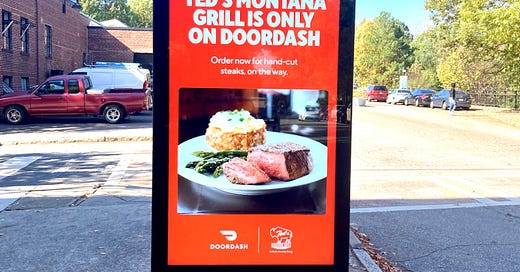Towering Vertical Billboards Coming Soon to a Sidewalk Near You
The 8'4" billboards will be installed throughout downtown, then in business districts all over the city.
By Erica C. Barnett
The Seattle City Council approved a long-term permit on Tuesday that will allow IKE Smart City, a Columbus, Ohio-based advertising company, to install 30 towering vertical billboards on sidewalks throughout downtown Seattle, plus another 50 in other business improvement areas in the future. Profits from the ads will go to the Downtown Seattle Association, which will also be responsible for maintaining the billboards. The kiosks are eight feet and four inches tall.
Cathy Moore and Alexis Mercedes Rinck voted against the permit; Dan Strauss was absent. The permit is for 30 years, with a renewal after 16 years and 6 months, meaning that—at a minimum—the council is committing to allow what are essentially giant iPhones on public sidewalks well into the 2040s and 2050s.
Seattle's sign code strictly prohibits "off-premises" ads and billboards downtown, and the council has historically been reluctant to permit new clutter in the pedestrian right-of-way.
The DSA's proposal gets around that prohibition by seeking a special 30-year permit called a "term permit," which was previously reserved for “significant structures,” like skybridges and tunnels, that need access to city right-of-way on a long-term basis. According to a council staff memo on the proposal, the workaround will "allow for off-premises advertising in the right-of-way which would otherwise not be allowed under existing code."
Under the permit, the DSA will receive all excess advertising profits (after IKE takes its cut) up to $1.1 million a year; anything above that would go to the city. Beyond that, the city is only guaranteed the $13,000 annual permit cost. Proponents, including council president Sara Nelson, have argued that the city will receive substantial non-financial benefits from the kiosks themselves, which will display art, maps, information about local events, and emergency updates.
By allowing illuminated sidewalk billboards, the city council has set a precedent that will make it hard to turn down similar requests to put ads in public rights-of-way in the future.
The kiosks have also raised privacy concerns because they come equipped with cameras—an optional feature that not all cities have agreed to. During a demonstration at City Hall last month, representatives from IKE said the cameras will only turn on when a kiosk user activates the kiosks' "photo booth" feature. The memorandum of understanding with the DSA includes a legally binding commitment that the kiosks will not include "any video camera recording functionality whatsoever" and will only allow still images when a user activates the photo booth.
Privacy advocates have expressed concerns that these reassurances could be reversed in the future. "My concern is that this is a slippery slope—once the kiosks are out there, you can retrofit them” to include cameras, Tee Sannon, technology policy program director for the ACLU of Washington, told PubliCola last year.






Spare the ACLU overdramatic scare tactics as if keeping us safe denying a video feed to the CCTV that would allow public safety to quickly respond if something takes place on the video
I'm not seeing these survive a sledgehammer, but I guess it's worth sacrificing one to verify the assurances that they won't take video.